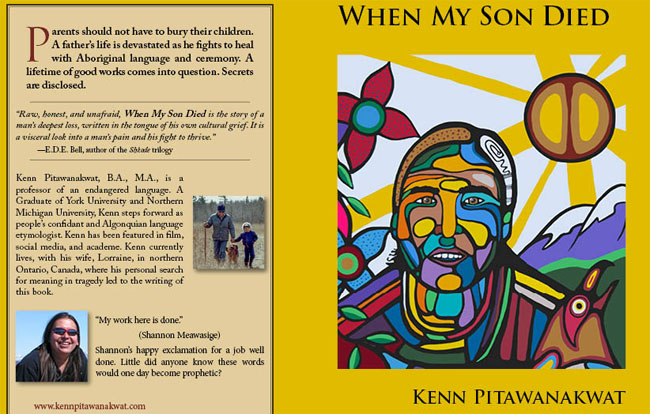‘Love your children,’ says author
Wikwemikong’s Kenn Pitawanakwat has published a heartfelt message to his son in his recently launched book, When My Son Died, which is available at Amazon, iBooks and Kobo.
“Love your children,” Pitawanakwat says in an e-mail comment about his book. “Do not leave them, tell them you love them every single moment. All to often we say to ourselves, I’ll do it later. My mistake was I did not hold on to my boy long enough, and there was (one) time I discouraged his dream.”
Pitawanakwat wrote the book to heal.
“That’s cliché,” Pitawanakwat says. “I wrote to tell Shantu that I never knew how happy I was, until he died.”
Pitawanakwat began writing the book in the summer of 2014, and after the editing process it went to print this past November.
“The writing process was a job,” Pitawanakwat says. “I got up each day and poured my heart out to my boy. I had to remain open and honest and not try to colour it bright. In cases it was. But I had to be honest with myself.”
Pitawanakwat wrote the book as if no one else would read it.
“It was between my boy and myself,” Pitawanakwat says. “It was a last and parting testimony. I got up six to seven days a week and just like any other job I opened my thoughts and feelings. There were times I did not want to. But it was process of extreme effort. Taxing, for the heart and mind.”
Pitawanakwat says he spent a lot of time soul searching and crying during the writing process, but after his wife suggested he write the book as if it was a letter to his son, he began to make headway with the writing.
“I wrote as if he was before me, and expressed my innermost fears, and emotions, and the things I did not want for him, and for him to understand my cultural upbringings,” Pitawanakwat says. “That is to say, I was a product of my time, as were my parents and grandparents. I woke up to the realization that I came flawed and never did I wish to inflict these scars onto my children.”
Pitawanakwat says his son loved his family and was protective and nurturing with his siblings.
“He was an affable friend and joker of the first realm,” Pitawanakwat says. “He was quick of wit and thought. And he was a beautiful physical entity. He always had friends. And I was happy to share moments with him.”
Pitawanakwat often teased his son about humility.
“Son, I would say, I changed your diapers many, many times,” Pitawanakwat says. “We always howled. Howling with laughter is a thing of the past. Anyone who has ever buried his or her child will know.”
Pitawanakwat believes his son would respond to the book by saying: “Awesome Dad! Now just watch the fireworks!”
“In Nishinaabe culture we all get visits from our families that have departed this physical realm,” Pitawanakwat says. “At least I did, over my entire life. It’s also amazing how many (others) have expressed these visitations over the years. They are seeking clarity and confirmation: ‘Did this really happen?’”
Pitawanakwat says grown-ups often dismiss these episodes as fairytales.
“Sadly, most of us have lost touch with the spiritual,” Pitawanakwat says. “My boy would say, feed us. Feed me. Feed our ancestors. Offer us semaa (tobacco). Often.”
Pitawanakwat has received a good response to the book as of Dec. 10, including the possibility of movie deals.
“It will be better as the word gets out,” Pitawanakwat says. “There has been some discussion about movie deals. Discussions are in place.”
Pitawanakwat’s vision is to create a foundation to assist with funeral expenses.
Orders and reviews can be placed at Pitawanakwat’s website:www.kennpitawanakwat.com. Information is also available at:www.facebook.com/kennauthor.


